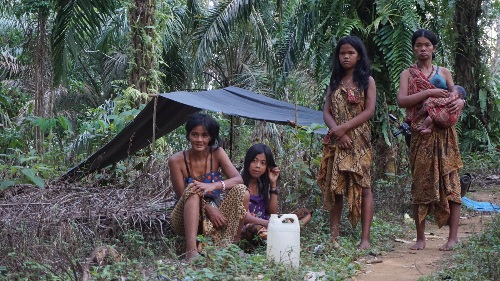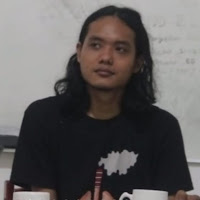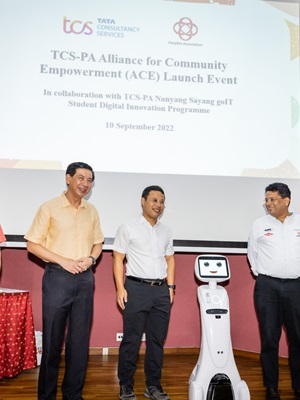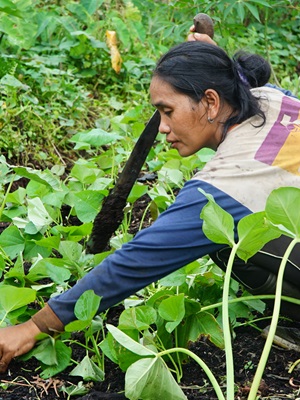Sudung - a tarpaulin hut without walls that houses several members of the Orang Rimba group stands under an oil palm plantation on the edge of the road in Hajran Village, Batin XXIV District, Batanghari Regency, Jambi. The roar of tronton trucks carrying coal across the dusty road has become a daily sight.
Not far from the road stood a man carrying a toddler Orang Rimba woman, shabby and whining. Occasionally her nose runs and her cough refuses to stop. The coal and dust of the road could not be repelled by their shelter without walls.
"Our house used to be here (in the forest), but now we have to live in the company's plantation. Our forest has been destroyed by oil palm plantations and coal mines," said 54-year-old Tumenggung Ngalembo, teary-eyed, describing the current condition of their living space. Tumenggung is the name given to the traditional leader of the Orang Rimba group.
Orang Rimba is a semi-nomadic indigenous people in Jambi Province, Sumatra, Indonesia. They used to live in the forest in groups with each other. Each group was led by a tumenggung (traditional leader). Most of them hold beliefs in gods and ancestral spirits.
The Orang Rimba used to carry out traditional practices, such as hunting in the forest and collecting foodstuffs of tubers, medicinal herbs, and fruits. The most recognizable tradition d
The Orang Rimba used to carry out traditional practices, such as hunting in the forest and gathering foodstuffs of tubers, medicinal herbs, and fruits. The most recognizable tradition of this community is melangun - a tradition of moving to a distant place to forget the sadness of losing a relative.
However, since the last decade, the existence of the Orang Rimba, including the Tumenggung Ngalembo group, has been continuously eroded by corporations and extractive industries that have exploited forests for mining, oil palm plantations, and industrial monoculture crops. Customary traditions and rites are slowly fading away due to deforestation.
In addition, their living space continues to narrow due to the expansion of extractive industries and various other development projects that do not favor indigenous peoples.
Tumenggung Ngalembo has long been a witness to forest exploitation. The faces of his group members are gloomy when they see the jungles being cut down and the earth dredged. Heavy bulldozers roared in and out of the forest.
Now in the absence of the jungle, they survive amidst uncertainty. Their daily activities to find food and livelihood are increasingly difficult. The loss of forest has further exacerbated their socio-economic problems.
"In the past, all sources of materials were available in the forest. Now it's getting harder to find game," Ngalembo said.
Structural Inequality
The development and investment coming into Jambi Province is inversely proportional to the level of welfare of indigenous peoples. Indigenous communities such as the Orang Rimba who rely on forest resources must bear the burden when development comes around them.
Their resource assets are easily destroyed and converted. Now the Orang Rimba live without the jungle. The loss of forest has changed their lives.
The latest survey conducted by KKI Warsi - a non-profit organization that focuses on conservation and empowerment of indigenous peoples - recorded that the population of Orang Rimba reached 5,200 people. This number is spread across several districts in Jambi Province.
In Jambi Province, the Orang Rimba are organized into groups. Each population of jungle people always has a group of children, one mother has an average of more than five children.
Now the massive conversion of forests into oil palm plantations has made it increasingly difficult for Orang Rimba groups to find food sources. The remaining forest area in Jambi is 900 thousand hectares or 17 percent of the total area of this province.

The decreasing forest area has also displaced the Orang Rimba. Orang Rimba still has difficulty accessing access to health and is overshadowed by poverty.
According to KKI Warsi Senior Advisor Rudisyaf, of the total Orang Rimba population, around 99 percent live in poor conditions. Apart from living around forest areas, the Orang Rimba also live semi-nomadically along the central Sumatra crossing road in Jambi.
“Whether you want to use any measure or parameter, Orang Rimba is the poorest group of people,” said Rudi.
Apart from poverty, the Orang Rimba group also has an unhealthy lifestyle. Not infrequently during difficult seasons, Orang Rimba children consume palm fruit and unhealthy food.
For the short term and very urgent, especially for Orang Rimba who are experiencing malnutrition and illness, Rudi said, the government must immediately take emergency action. Provision of food, additional nutrition and immunization must be done immediately.
"The children of the jungle people have the right to be healthy, so if we look at these conditions, it is very necessary to have a health budget specifically for the jungle people group," Rudi said.
Missing the State's Attention
Amidst the crush of industrial expansion policies, with unclear legal status. The lack of access to education, health services, and the absence of certainty of customary territories has made the Orang Rimba increasingly marginalized socially, economically, and politically.
In this condition, they continue to survive with all limitations, often escaping the attention of the state and the public.
Academician who once served as Coordinator of the Center for Human Rights and Development Studies at Jambi University, Doni Yusra, said that the state is constitutionally responsible for the economic rights of its citizens, including ethnic minorities whose average life is below the poverty line.
“What happened in their area (Orang Rimba) was given a permit for oil palm plantations, so what happened was that they would clash with the company,” said Doni.
In the aspect of economic, social and cultural rights (Ecosob), he said, it has been recognized as protected by international and regional human rights instruments. The state is obliged to fulfill every right of its citizens.
Human rights, said Doni, are attached to human welfare issues that must be the concern of all parties. In addition, human rights, according to him, are not merely about legal norms and instruments. Orang Rimba is an isolated community that builds its life in the forest area.
What Tumenggung Ngalembo's group experienced is part of a small screw of how Orang Rimba in Jambi Province still lives in uncertainty.
Government support to bring them out of the economic squeeze is still very minimal. Orang Rimba - a minority community - still finds it difficult to adapt to the massive development and investment that is not in their favor.
Until now, they continue to think for themselves and work out how to make a living for their future generations.
Posted 04/09/2025

















